One of many powerful impressions from the Psychedelic Science conference was of a constant need to make difficult choices. Should I go hear a talk from Mexican Senator Alejandra Lagunes about her work on psychedelic reform? Or learn instead about the ancient history of psilocybin mushroom use in Indigenous Mesoamerican cultures? Or skip both and browse the massive expo room with hundreds of vendors selling mushroom samples, infused teas and chocolates? The “Deep Space” room, with its cushions, dim neon lighting and music performances, was another temptation.
Psychedelic Science was hosted in Denver, Colorado, by the Multidisciplinary Association for Psychedelic Studies (MAPS) from June 19-23. It featured many lectures, panels and group discussions on the fast-changing science, cultures and policies of psychedelic drugs. Notable (and notorious) speakers included Colorado Governor Jared Polis, former Texas Governor Rick Perry, Drug Policy Alliance Executive Director Kassandra Frederique, rapper and actor Jaden Smith, bestselling author Michael Pollan, and Columbia University neuroscientist Dr. Carl Hart.
“Every one of us can step out of the psychedelic closet.”
This event, the first MAPS has hosted since 2017, was branded the biggest psychedelic conference in history: An unprecedented 12,000 people from around the country—and the world—participated, exchanged ideas and joined dance parties, tea circles, film screenings and art shows.
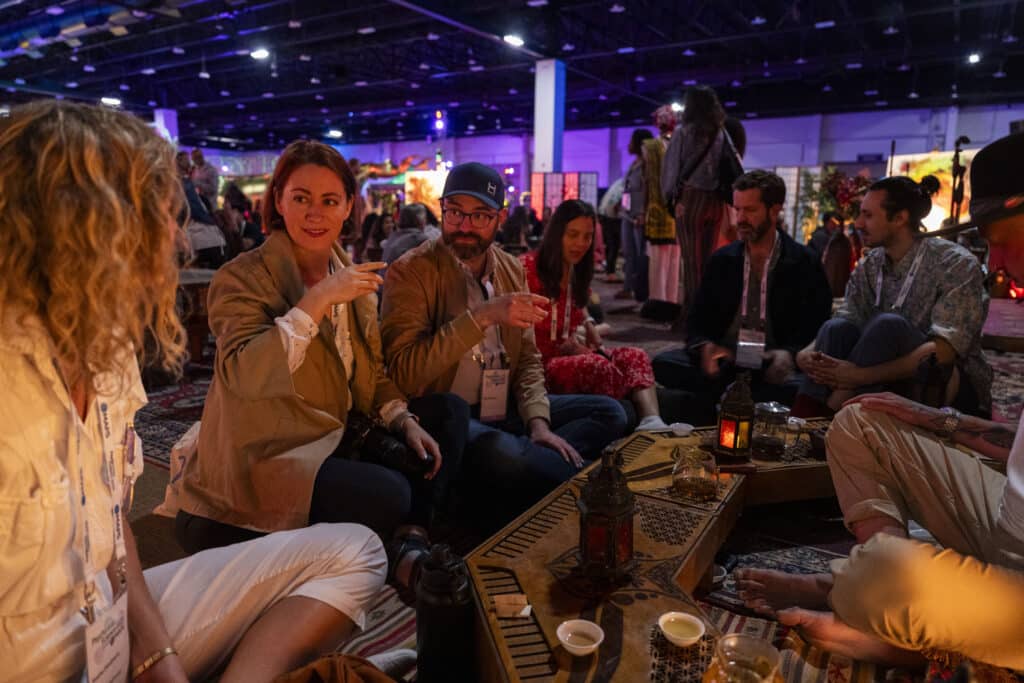
A “Deep Space” tea party. Photograph courtesy of Psychedelic Science 2023.
It all felt like an overwhelming physical representation of how far the psychedelic movement has come—even if much of the content focused on how far it has yet to go.
MAPS founder Rick Doblin predicted in a speech that MDMA will be federally approved to treat PTSD within 12 months, allowing any doctor to prescribe it. He also praised reforms in the city of Denver and state of Colorado, which respectively decriminalized psilocybin mushrooms in 2019 and saw voters approve Proposition 122 in 2022 to legalize psychedelics for healing. “Every one of us can step out of the psychedelic closet,” he said. He also said the US population could reach “net-zero trauma” by 2070 with the help of these substances.
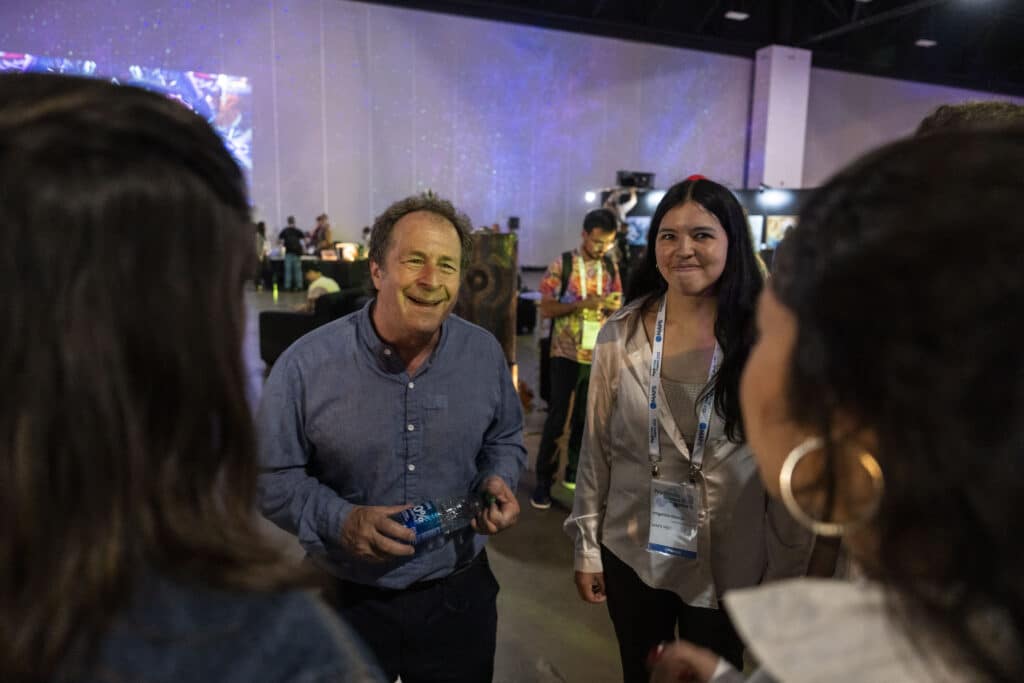
MAPS founder Rick Doblin (center), courtesy of Psychedelic Science 2023.
“What we’re really going to need to do is prioritize going to global communities with larger burdens of trauma and fewer resources of treatment,” he said. “We’re going to need to use psychedelics for conflict resolution. Psychedelics are just tools.”
Gov. Polis (D) vowed to work with the state legislature to pardon people convicted on psychedelics charges that no longer apply after Prop 122. “Anybody who has something on their criminal record that is now legal can have that expunged and doesn’t hold them back in future employment,” he said. Former Gov. Perry (R) described his advocacy of psychedelic treatment for military veterans, including support for a pilot study approved in his home state. “Let’s look at what the results are,” he said. “Let’s not look at what the government tells us. Let’s not look at what somebody tells us is right and wrong.”
We’re now entering the “psychedelic ’20s,” as Doblin described it. Culturally, psychedelics have become mainstream enough that thousands of Democrats and Republicans, Zoomers and boomers, and people of all ethnicities, genders and religions can talk openly together about them.
Research trials have brought psilocybin, as well as MDMA to the brink of medical approval as a mental health treatmen—while countless other studies are looking at LSD, ayahuasca, ibogaine and more. And on the policy side, amid the now-inevitable continuing spread of cannabis legalization, we’re seeing Oregon roll out legal psilocybin for healing purposes, as other states approve (and fund) psychedelic medicine pilot programs, and now dozens of cities decriminalize personal possession of these substances.
Will regulations and licensing restrictions make psychedelics a luxury commodity, legally available in practice only to the wealthy?
But these advances raise big questions. What will replace the “War on Drugs” and the arrests and imprisonment of people who use them? Will we ultimately respect everyone’s right to use these substances for healing or pleasure? Or will we limit that right to some drugs and not others? And will regulations and licensing restrictions make psychedelics a luxury commodity, legally available in practice only to the wealthy, while others must continue to risk criminalization?
At Psychedelic Science I was blessed to finally meet in person many individuals I’ve previously interviewed and written about—people who are asking these questions and more, and fighting for social justice, harm reduction and benefit maximization in the psychedelic space.
The Fight for Inclusion
One of them is researcher and activist Yarelix Estrada. Among many involvements, she’s the director of the New York City Psychedelic Society. She’s also on the board of the Source Research Foundation, a nonprofit which gives small grants to community groups for psychedelic-related projects. It started a program to send people to conferences who wouldn’t otherwise be able to afford it—often people of color and people from the Global South—in a direct effort to make the field more inclusive.
“It doesn’t take much to go to an event like this and look around and realize, ‘I am a minority,’” Estrada told Filter. “That’s reflective of most psychedelic spaces.”
“It has become more diverse,” she continued, but “when we first started doing integration circles in 2019, most spaces were still really white. I would share vulnerable experiences, and the grief I had when I first started journeying with psychedelics was around forced migration, the pain of acculturation, not having good assimilation into American culture. When I would share that as the only person of color, I would just be met with confusion, or people would ask me stupid questions—it just felt really gross.”
Kufikiri Imara has worked to create a film to address similar concerns, as the associate producer of A Table of Our Own. The documentary portrays how Black people in the psychedelic community are creating their own systems of support to shape the future.
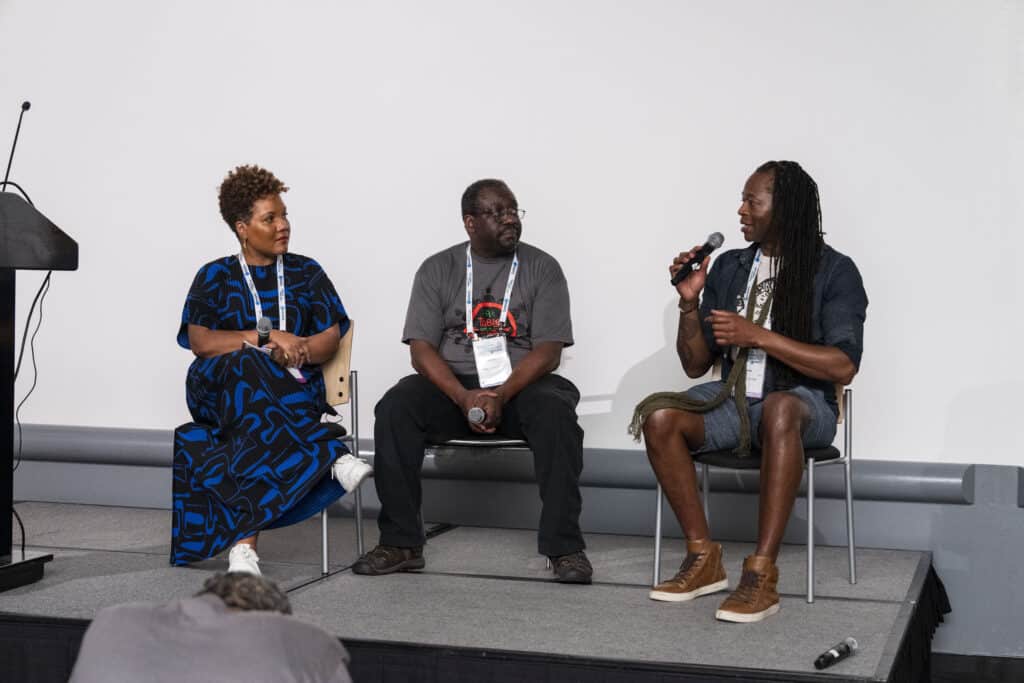
Ayize Jama-Everett (left) and Kufikiri Imara speaking (right). Photograph courtesy of Psychedelic Science 2023.
“It was a conversation between myself and my colleague Ayize Jama-Everett,” Imara told Filter. “We were talking about [how] standard treatment for Black people in the psychedelic space is very tokenized; we wanted to do a project that was coming from our and for our community, in a way that honored, uplifted and highlighted luminary voices in contemporary Black psychedelia.”
“We wanted to focus on the benefit of being seen holistically as a Black person in an all-Black space … itself a form of medicine, a salve, a regenerative force,” he explained. “When I was building the [film schedule] … I wanted folks to have an opportunity to grow in community. Any topic we were speaking to, people felt like they could speak to it in a way where it wasn’t going to be in a trope of re-victimizing, victim-centralizing narrative and the whole person could be seen as well as speaking to challenges and traumas in their life.”
“What’s important about having all-Black spaces, especially with regards to healing, and in a marginalized community and oppressive society, is it’s culturally rooted to where the people that are gathering live,” Imara said. “It’s going to look different in LA compared to Memphis, DC or Oakland, which is why it’s about starting conversations and building connections of solidarity.”
“We talk about, what does it mean to appreciate something versus appropriate it?”
The conference program also featured speakers representing Indigenous groups from the United States and globally. Indigenous Americans have some of the oldest traditions with psychedelics and entheogens, including psilocybin, peyote and ayahuasca. But the legacy of colonialism and genocide sees ongoing health, social and economic disparities, and barriers to benefiting from decriminalization and commercialization of these drugs. Across Central and South America, meanwhile, the drug war and climate catastrophe inflict large-scale violence and displacement on Indigenous peoples.
Just as Black and Brown communities have been excluded from the profits of cannabis legalization while being subjected to continued policing, many Indigenous people are asking how psychedelic reforms will benefit them.
“We talk about, what does it mean to appreciate something versus appropriate it?” said Steven Benally of the Diné people, a board member for the Indigenous Peyote Conservation Initiative. “Appreciation means to appreciate what someone has that is dear and sacred to them by respecting it. You let them take care of what they have on their terms, in the way they believe it. It doesn’t mean to appropriate, to innovate, to take without approval. If they have within their hearts to share what they feel is sacred, that’s their call.”
Estrada’s work on inclusion has involved organizing spaces like psychedelic meetups designed at helping people of color to not feel “alone even in a room full of people.”
“A lot of people of color don’t have good health care or don’t have a lot of money, so we offer those spaces for free,” Estrada said. “If [people] don’t have access to a psychedelic therapist or guide, they can ask questions about how to start engaging with psychedelics … or just to share if they had a really intense experience and they’re not sure what happened, just to get reassurance about how they can recover from it and make sense of it.”
Drug Checking
No drugs, of course, are entirely without risks—though many risks stem from people not knowing what they’re consuming, thanks to the lack of regulation that prohibition entails. Numerous organizations work to mitigate this problem through drug-checking services, and one of the best known—particularly in nightlife and psychedelics contexts—is DanceSafe.
Rae Elkasabany runs the fourier-transform infrared spectroscopy (FTIR) program at DanceSafe DC, utilizing sophisticated technology to identify multiple substances that may be present in a person’s drug sample. “I organize technicians at events we’re servicing,” she told Filter, and “I run the outreach getting our chapter at events and organizing volunteers.”
This events work is a valuable protection, but it’s obviously limited to the populations who attend. While DanceSafe “doesn’t do too much outreach [to unhoused people, for example], my chapter tries to support organizations that do, like BMore Power, and others who provide naloxone training, sterile syringes, fentanyl test strips,” Elkasabany said. “I try to support by providing access to drug checking.”
Outside of DanceSafe, she continued, “I also work for Johns Hopkins University, developing a mobile FTIR program so we can go out into those communities and provide drug-checking services directly. This would include serving homeless populations and people using drugs who don’t have access to health care, housing and employment, who are living in poverty.”
“We have people come in and provide the substances and we can have a conversation as we look at it.”
Many others are doing comparable work. Taylor Wood, for example, manages drug-checking projects at the Chicago Recovery Alliance. “We have a reagent program where we’re training students and community groups to test among their peers,” he told Filter. “We also use FTIR checking in our own labs, and work as an immunoassay test-strip validation site for fentanyl, xylazine and benzodiazepine test strips. We’re looking at the efficacy of Seroquel test strips here shortly. In addition we get funds from the CDC foundation to bring community-based drug checking throughout Chicago. We’re starting a training program with Cook County to train other syringe service programs in the Chicago area.”
To reduce barriers, there are a couple of ways for people to access these services, Wood explained. “We have people come in and provide the substances and we can have a conversation as we look at it. Another option that’s more anonymous is they can drop off a sample at one of our dropboxes, and they can provide a burner contact email or phone number, so we can reach them with the results.”
However, “I prefer when people come in because we get a better understanding of people’s usage,” Wood said. “I also learn a lot from people: The supply in Chicago varies, there’s so many attributes just in the dope. To hear, ‘this dope made me feel this way, this dope made me feel this other way,’ to aggregate that data and then identify what is causing that, we can go back and say, ‘This is what’s going on and this is how we can apply harm reduction to it.’”
Some people are doing this work on a more personal scale. Phoenix aka Mohawk, the “Rebel Educationist,” recently participated in a research study in Cape Town, South Africa, where they were able to bring an FTIR spectrometer. “I did a lot of testing on their street supply to generate data that would allow them to scientifically back efforts to change policy and public opinion,” they told Filter.
“I’m just winging it and that’s how I’ve been doing harm reduction work this entire time.”
But “doing this work in New York City,” they continued, “I recognize I’m only one person. There’s a lot of issues that are really tied up and can’t be detangled from drug use. I’m trying to see how I can continue to help serve the communities in NYC and beyond. I’m not going to be testing hundreds and hundreds of samples a week, there’s no way to keep up with the demand of how many people need testing services, even with other people in New York doing this.”
“My challenge I’m concerned about,” Mohawk concluded, “is this is completely unsanctioned work—I’ve got a machine and that’s basically it. I’m not funded by the department of health or any nonprofit, I’m not affiliated with any institution that says I get to do this. I’m just winging it and that’s how I’ve been doing harm reduction work this entire time—being ballsy and seeing how far I go before I get in trouble.”
Drug checking unequivocally helps keep people safer. But it is a needed response to the bad situation current policies have created, rather than any kind of holistic solution.
“Getting at the root cause is really challenging, right now we’re just dealing with the symptoms,” Elkasabany said. “What I really like is being able to provide data to support the need for larger policy change. Through Hopkins we work with the state health department and the National Institute of Standards and Technology; we’re collecting data from all parts of [Maryland] on the drug supply and trying to develop more effective real-time interventions.”
Healing and Liberation
Just as drugs carry risks and potential harms, they are also tools with many demonstrated and potential benefits. But unlike the harms that dominate daily headlines, these benefits—including simple pleasure—are routinely ignored under society’s abstinence-only paradigm. The misleading imbalance has prompted some advocates, including conference speaker Carl Hart, to argue that we should move beyond “harm reduction” in describing our response to drugs.
Psychedelic Science featured many people whose work is framed around maximizing positive drug outcomes—healing, enjoyment, liberation—rather than just minimizing negative ones. And there are good reasons most don’t work in medical settings.
“We have to recognize that medicalization is also a strategy to harm people.”
“It’s important for us to recognize the medical system is not a benevolent system, we know it has inherent racism and inequities,” said Kassandra Frederique. “This idea that psychedelics will shift a corrupt system is historically inaccurate and incredibly naive and dangerous. We have to recognize that medicalization is also a strategy to harm people.”
Dre Wright, founder of the Ancestor Project, and Phoenix Destiny, its director of communications, discussed how they facilitate plant medicine ceremonies in Baltimore and New York.
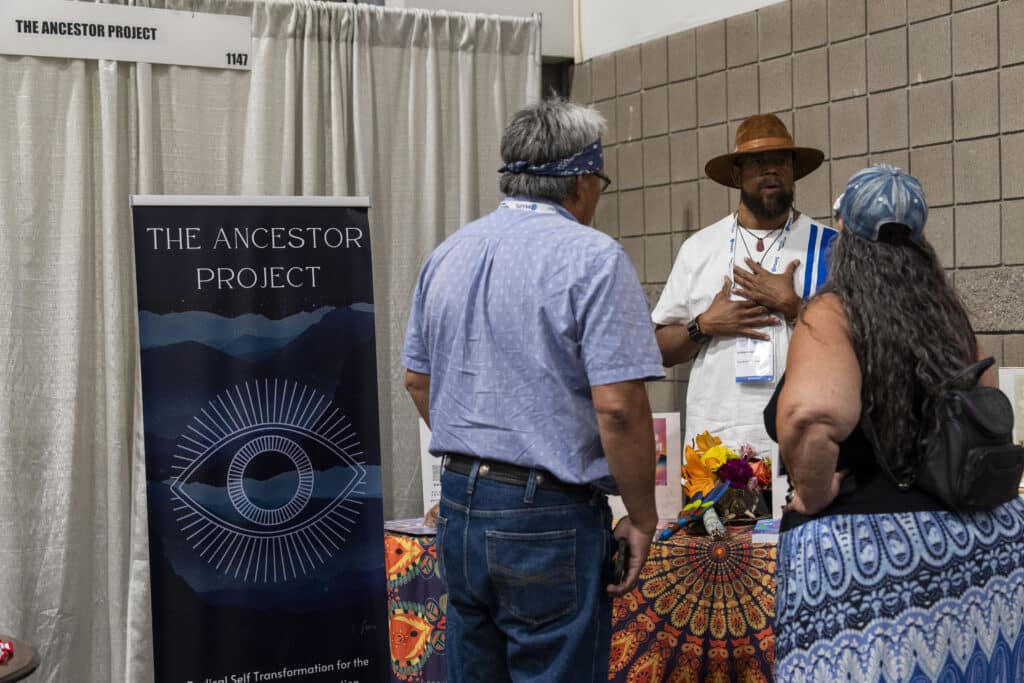
Dre Wright (center). Photograph courtesy of Psychedelic Science 2023.
Wright described kambo, a set of practices that originated in South America—along with “sacred mushrooms, grandmother ayahuasca, 5-MeO DMT”—as “just some of the allies we work with.” He has trained with Shipibo-Conibo and Lamas Quechua shamans from Peru.
“Our priority is collective liberation,” he told Filter. “How we will get there is get people radically in love with themselves. Radical transformation will lead to collective liberation. We do that by paying attention to how our ancestors approached their relationship with medicines and themselves, by going to ceremony, connecting deeply with spirit, with gentleness, respect and reverence. They were there not just for themselves but for everyone in the community.”
“We believe life should be lived as ceremony, it’s one big circle,” Destiny added. “Ceremony could be necessary for our witnessing and growth as individuals. We believe in rites of passage, to mark important milestones in our lives. A lot of folks who approach us are seekers, they’re curious about it and they reach out to us.”
“We just provide the space and are ready to serve them,” Wright said. “We’re not prosyletizing, we’re not trying to convince anybody. People are ready to surrender. That’s how it’s always been done.”
“I see my role as helping provide access to people who can’t or don’t want to access above-ground experiences.”
Gabe is a cofounder of the Rhizome, a community space in Portland, Oregon, which he described as “dedicated to education, harm reduction and healing through the shared experiences of psychedelics.”
“We bring people together to help integrate and hopefully help them heal along the way,” he told Filter. “I started doing this because I had my own encounter with psychedelics, and from that place I wanted to spread that experience to others.”
“My role is nurturing and respecting the underground traditions,” he continued. “I’m very moved by the above-ground efforts here, but I see my role as being where the mushrooms live, which is underground, and helping my people down there and helping provide access to people who can’t or don’t want to access above-ground experiences.”
“It’s important we have respect for every level of the experience, so people who sell and manufacture drugs, or work with non-psychedelic drugs, are all brought into the fold and given a seat at the table,” he concluded. “Respect for the history of prohibition and all the people who’ve died and been in prison because of it. And accurate, science-based, heart-centered education.”
New York-based psychedelic advocate Oriana has taken a comparable path, but through the less orthodox route of becoming a chaplain.
“I always wanted to become a psychedelic therapist and I’m going to do everything I can to become one,” she told Filter.
But “I was never encouraged to pursue a degree,” she continued. “I was told by many white people that I would never get my PhD and I should do social work; I lost a lot of faith and I left to do organizing. I always wanted to keep doing this and bring MDMA to my communities and people, especially survivors of trauma. I had a calling with God that told me, I can do divinity school now or do it later but you’re going to do it—so I did it.”
The “pastoral care” of chaplains is “a form of counseling,” she added. “Chaplains are not bound to religious institutions, and we work outside of them. The top chaplain in the US is an atheist; you don’t have to believe in God to do this. The difference between chaplains and therapists is chaplains are not afraid to work with God, or the divine or spirituality. We don’t freak out, we don’t think it’s mental illness, we hold it.”
“My hope is to provide this care to survivors of color who experience violence in our country,” she concluded, “whether racial, gender-based, or sexual.”
Thinking Bigger
The topics of my interviews in Denver represent only a fraction of the extraordinarily diverse disciplines, perspectives and experiences that could be found there. To what extent can—or should—such a multitude of activists, scientists, practitioners, artists and more be unified to speak with one voice? And further, to link with movements across other social justice and human rights causes?
“We should be thinking bigger in all the demands we’re making as a movement.”
These are questions that have occupied, among others, Jason Ortiz, the executive director of Students for Sensible Drug Policy.
“We should be thinking bigger in all the demands we’re making as a movement,” Ortiz told Filter. “We at SSDP have been trying to figure out what is a unifying rallying cry that we can all get behind.”
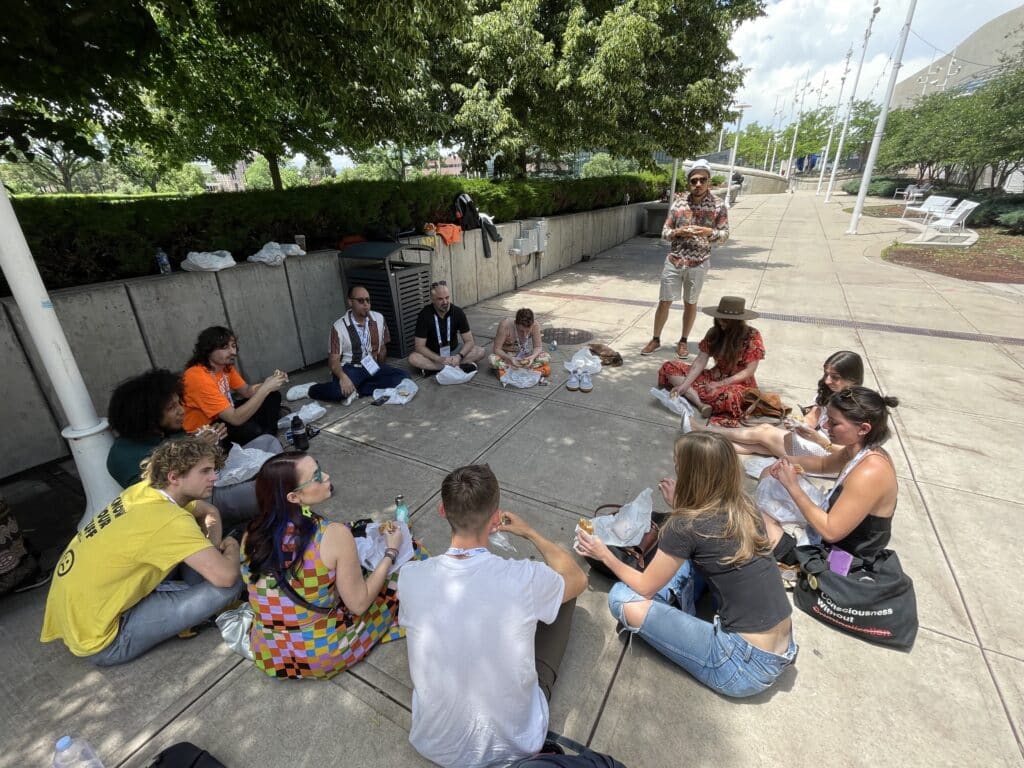
Jason Ortiz and SSDP members meeting for lunch. Photograph courtesy of SSDP.
“I was really here to test out the waters with the idea of a constitutional amendment for bodily sovereignty,” he continued. “That would cover not just drug use but also reproductive health care, trans medical access and anything relating to your body. I was pleasantly surprised by the reception to that. Folks definitely felt like it’s something we can do. Once I saw the scale at which we’re currently operating and the power of the movement right now, it just cemented that.”
“The first step is laying out exactly what we want and the language. That is a communal conversation that needs to happen internally,” Ortiz said, and must involve “reaching out to all these other communities that would benefit from this law and have them review what they think the language should be to make sure it’s inclusive.”
Turning to more immediate politics, he said that “during this presidential election, we should all be demanding in the psychedelic and drug policy space an actual end to the ‘War on Drugs.’ An official statement: This is a bad policy, we’re not doing it anymore, the war is over.”
“And now,” he said, looking ahead, “we can start to rebuild after the war. We need a truth and reconciliation commission, in order to really look at what happened so we can never do this again. Once we have grappled with all the negative consequences, the coalition that can back this amendment will start to find champions for it both in the state legislatures and federal government.”
“But by bringing [together] entities like the drug policy and reproductive rights movements,” he emphasized, “we’re talking about thousands of people in every single state that can move at the same time.”
Top photograph of Jaden Smith courtesy of Psychedelic Science 2023
The Influence Foundation, which operates Filter, previously received a restricted grant from the Drug Policy Alliance to support a Drug War Journalism Diversity Fellowship.





Show Comments